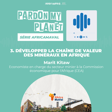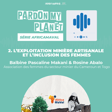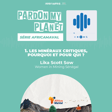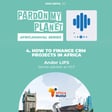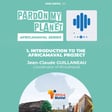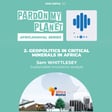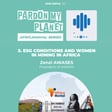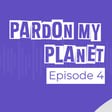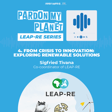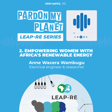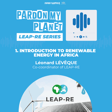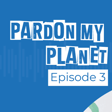Introduction to Africa-Europe Partnerships
00:00:10
Speaker
Hello and welcome to Pardon My Planet podcast. I'm Anne-Charlotte, your host. This episode is part of our series, Bridging Continents, the Africa-Europe partnerships for critical raw materials.
Artisanal and Small-Scale Mining (ASM) Overview
00:00:22
Speaker
Today, we're focusing on artisanal and small-scale mining, ASM, in Africa, a sector that supports millions of livelihoods, yet remains largely informal and faces major challenges.
00:00:37
Speaker
We'll talk about a recent training program carried out in Zimbabwe to understand how knowledge exchange and capacity building can support more responsible and sustainable practices in ASM.
Expert Insights on Responsible Mining
00:00:51
Speaker
To explore this, we are joined by Shahzad Manoucheri, Program Manager at the World Resources Forum and on the Africa Maval Project, and Robin Gilley, Project Manager at the World Resources Forum,
00:01:06
Speaker
specialized in responsible sourcing and mining. Hello Shazand and Robin and welcome. Thank you. Thank you very much. For those who might not be familiar, can you give us a definition of the artisanal and small scale mining? Why is it relevant to focus on ASM when talking about critical raw materials?
00:01:29
Speaker
The ASM, artisanal and small scale mining in general is you say um it's a very diverse group of individuals. So it's not exactly so easy to to pin one definition, but in general, it is mineral extraction by individuals and small groups, cooperatives that rely very heavily on physical labor um They extract minerals using basic tools and um and rely heavily on less less reliance on heavy machinery, but but rather physical labor, simple tools.
Transition to Critical Raw Materials Extraction
00:02:09
Speaker
And in general, they are a sector with minimal capital and minimal investment. um The sector also ranges, it's difficult because the sector ranges from informal or unlicensed and um unregistered operating sort of outside of formal economic and legal structures.
00:02:37
Speaker
And also formal and there are also individuals who are formalized, who are licensed, who are registers, and they are recognized by local governments. So it's quite a range of individuals.
00:02:52
Speaker
um Why we focus, want to focus, or there's an increasing focus on ASM um is because the ASM, who was traditionally always associated with extracting gold, is now extracting critical raw materials.
00:03:09
Speaker
And for many in, not just in Africa, but around the world, you know, ASM is a subsistence mining activity. In other words, they they do this to for their own subsistence, basic livelihoods.
00:03:26
Speaker
um But for others, maybe the more small scale individuals, they have um legitimate operations, they are operating inside of these legal structures and um and their operations are more mechanized. So do you have any examples of the type of of ah ah critical raw materials that they are mainly extracting?
00:03:51
Speaker
Yes, well, um in in Africa, where we have experience with the trainings, we have um met individuals who are extracting lithium, minerals that contain lithium.
00:04:05
Speaker
There's also um individuals extracting cobalt, of course, in the DRC. This is a very famous example, a well-known example, I guess. um Yeah, the 3T minerals, which are the tin, tanalum, and tungsten, they're also very active in 3T mineral extraction.
00:04:26
Speaker
Yeah, so they they they understand the nature of the the this evolving critical raw materials landscape. and So just as you said, it's ah complex, ah vast, often misunderstood sector as well.
00:04:43
Speaker
It's vital part of the mining value chain.
The Africa Maval Project and ESG Criteria
00:04:46
Speaker
um ESG or environmental, social and governance criteria are a central theme in the EU-funded project Africa Maval.
00:04:56
Speaker
ah We previously explored ESG conditions with Zanzia Wasis from AWIMA, the Association of Women in Mining in Africa. So I encourage our listeners to check out that episode as well.
00:05:08
Speaker
ah Back to do today's topic, you led in 2024 the first session of a capacity building program in Zimbabwe, also in Zambia and Madagascar after that.
00:05:21
Speaker
What was the aim of this initiative and how did it come to life and what's the relation with yeah esg and This was basically a part of the Africa Mawal project, which I guess you have explained the project probably in previous editions of this podcast. The main objective of the project is to um establish or strengthen partnership but between EU and Africa on sustainable and responsible access to critical raw materials.
00:05:55
Speaker
And within this project, we ah have ah kind of placed a strong focus on understanding and supporting the artisanal and small-scale mining ah sector, kind of recognizing their importance as was previously mentioned by Robin, and and and trying to understand and support the sector.
00:06:19
Speaker
And one element that we considered as part of this and and supporting process or understanding process was to organize capacity building programs for ah for artisanal and small-scale mining in Africa.
00:06:36
Speaker
and To select the countries, I mean, we considered a set of criteria when we wanted to know, okay, where to organize this training. And among the different criteria that we considered, I can just highlight some of them. For example, one was the significance of the artisanal and small scale mining working on critical raw materials in that specific country.
00:07:00
Speaker
As ah Robin mentioned, traditionally, ah ASM was very active with gold, which is not a critical raw material. So we did a kind of mapping to see which countries have ASM active working on critical raw materials. And this was one of the criteria we considered.
00:07:18
Speaker
Another point that we considered for selecting the countries was that the potential to align the um um that the capacity building with the existing national or local programs on the ground.
00:07:35
Speaker
And of obviously another criteria was that we wanted to make sure that we have a ah local partner who can support us ah with the logistics, also with implementation of the capacity building program. So we went through a set of um process for selecting shortlisting the countries and Zimbabwe was considered as the first ah and choice and um in Zimbabwe we had a very good
00:08:10
Speaker
Zimbabwe Environmental Law Association, or in short ZELA, who used to organize this type of capacity building programs previously. So we joined forces and we decided to organize, that kind of co-organize this capacity building together with this organization.
Zimbabwe ASM Training Program
00:08:29
Speaker
So they had already the participants as well, I guess, in their network. It helped also to ah interest and to to connect with the participants, right?
00:08:40
Speaker
Exactly, exactly. This was the case. And even they had a program called ah ASM Academy. This was a program that they were organizing like trainings for ASM every every a year or twice a year. And we had this discussion that, okay, maybe your next edition of ASM Academy can be together with Africa Mobile, kind of Africa Mobile.
00:09:06
Speaker
ah contributing to the local ASM Academy program. When we did this needs assessment, one of one of the, you know, there were many things that we wanted to try to two um consider when we were considering the different countries where we could do this.
00:09:26
Speaker
And one of them was really just to to look at um what was needed by the ASM community themselves. What kind of information, where could we contribute knowledge um that would support specifically the extraction or the responsible extraction of these critical raw materials? And Zimbabwe specifically has a very large capacity for extracting of lithium from its hard rock sort sources, lithium.
00:10:00
Speaker
bearing pegmatites. And so um to to be able to contribute some knowledge on safe practices, on on good good environmental practices, um some knowledge on basic geology, mineral identification would only lead to to you know, the but participants having an increased knowledge about their own operations, but could really help improve the
00:10:31
Speaker
um improve the environmental environmental of the environmental aspects of their operation and and in the end become more productive. So we've considered many, many different factors.
00:10:44
Speaker
Was that one of the needs and challenges that the miners themselves raised up? Is it a discussion that you ah brought on the table? How did it happen?
00:10:58
Speaker
we ah wanted to make it impactful and relevant for the participants. So we started with a process of kind of needs assessment where we conducted several rounds of interviews, consultations with local experts as well as international experts that have been working with ASM previously.
00:11:21
Speaker
And we um ah tried with through these consultations and interviews, identify the relevant topics and needs of the sector and also based on the ah based on the local needs. Because...
00:11:39
Speaker
like for each country the needs might be different and the requirements for the ASM sector might be different. So we did it really for each country that we organized the training, we did a separate type of consultation and we identified the needs of the participants. And for this needs assessment, we talked with ah different groups of stakeholders, from representatives from non-governmental organizations or civil society or organizations in these countries, also with sometimes governmental representatives, as well as ASM communities themselves. So we really had the chance to be in contact with
00:12:22
Speaker
artisanal and small-scale workers and or representatives from communities that could support us with identifying the needs and the topical areas that we could cover during these trainings and the results of this consultation I'm just giving the example of Zimbabwe, for example, and that we realized that for them, for example, the and knowledge on geology of the ore deposit that they are working on, or for example, the topic of mining as a business, how to get access to finance,
00:12:59
Speaker
permitting and licensing or taxation that would imply to the ASM sector. These were among some of the ah key areas that they highlighted and obviously in all of this we considered the environmental and social ah and ah impacts that the sector might have also considerations as well as health and safety issues were among all these trainings.
00:13:25
Speaker
You had so in Zimbabwe around 25 miners participating in the program. ah They already have a rich practical field of expertise.
00:13:37
Speaker
That must have been first such an insightful exchange on both both sides on this. And were there any surprising needs or gaps ah that emerged during that program, something you hadn't anticipated?
00:13:54
Speaker
i can go I can start. ah i have to say, um over the course of the trainings in Zimbabwe, but in all of the trainings, um I guess it it wasn't really necessarily surprise, more as it was really inspiring.
00:14:13
Speaker
Sharsat spoke about ah the need for geology, the participants wanting to know more about geology. and you know, geology... the They were, I always say, the ASM, they're on the job trained geologists.
00:14:29
Speaker
They're on the job geologists. Maybe they didn't go to university and get an education, but they work with this material day in and day out, and they learn about it. And geology is ah is a...
00:14:40
Speaker
is a science of observation. And it really inspired me to see how um passionate the participants um got with the information on geology. it was like...
00:14:55
Speaker
they You could see how this knowledge that they were gaining was really going to um to impact their operations. You know, we're talking about um ah fundamentals of geology, mineral identification.
00:15:12
Speaker
or processing, you really saw this hunger for more of that knowledge. And as a passionate geologist myself, you know, this this was really inspiring to see some ah other groups of individuals really get passionate about, especially specifically the topic of geology. It was it was very nice.
00:15:33
Speaker
Yeah, I would also say that and for me, one pleasant and surprise was that ah the role that the um women were playing in the artisanal and small scale mining, at least within this program that we organized.
00:15:53
Speaker
So it was very nice to see the presence and leadership of of women. um Traditionally, it might have been the case that they had and more active roles in the operation phase, but there we could see their role as leadership, even ownership of minds was something that um was really, really interesting to see during these trainings. And just to support what Robin already mentioned,
00:16:21
Speaker
and In general, the enthusiasm and dedication of the participants was really inspiring. They were not only eager to learn, but they were also and kind of involved in all the discussions and tried to share their experiences, even their mistakes, you know, their challenges that they had.
00:16:43
Speaker
they very honestly and openly shared this with the old other colleagues. And it was also a kind of peer-to-peer type of learning between the participants, which was very nice.
00:16:55
Speaker
And regarding this and and regarding the access of information, this ah there is a whole, I guess, area, and now with the also internet still and the availability of the information, I guess,
00:17:12
Speaker
ah A lot of knowledge is also out there. So what is missing in the way ah that they are provided information for now that so provides them to get more knowledge, let's say, on the at least for the knowledge that they they need?
Hands-On Training and Government Engagement
00:17:29
Speaker
Well, I think the difference, at least in if I can speak from the perspective of being a geologist, you know you can read about geology online. You can read geology books.
00:17:41
Speaker
But there there are there is nothing like being with ah someone who has experience in geology getting your hands dirty and learning to see the rocks, learning to see the minerals, learning to see the materials working together to identify the little features that that determine can determine everything in your mining operations, you know, where to look for more ore or how to follow ore seam or what have you. And this kind of on-the-job process
00:18:21
Speaker
and this kind of on the jobb You know, hands on learning is really, really, think, in geology, it's it takes it to a different level than just reading out of a book, you can read out of a book, and that's going to provide you with a lot of information. But getting your hands dirty, that's what you got to do as a geologist.
00:18:41
Speaker
And what's the relation between this and ah let's say the ESG condition and also the environment? Is it because you have a better or knowledge, I guess also you know where to look for and therefore less damage? Is that understood correctly?
00:18:57
Speaker
and Yes, indeed. I mean, um for sure, having this knowledge would definitely contribute to a less less environmental ah damage that could call And this was something that we actually covered during these trainings, that we had um in-depth discussions about potential environmental damages that the extraction and operation of artisanal and small-scale mining can can cause.
00:19:27
Speaker
And one other thing that we really tried to during these trainings that was also appreciated by the participants, and it's also a follow-up on what Robin just mentioned, was that, for example, you you refer to the existing knowledge online or on platforms, applying for ah for permits or licensing or even getting environmental impact assessment for their operations.
00:19:56
Speaker
These are, at least in Zimbabwe, everything was online, all the information was online. But we could bring, as part of this training, ah um representatives from government, ah from in environmental organizations that were responsible for approving this, conducting environmental impact assessment and providing permits.
00:20:20
Speaker
And this was really interesting to see the exchange between the participants and these representatives because they they had lots of questions, they had lots of concerns, that it was they took it as an opportunity to one-to-one really raise their concern, their questions that they had for the Application process, for example, that the questions that they had to answer in these application forms.
00:20:47
Speaker
You know, very basic questions that maybe that the knowledge and the pla templates are available online, but really this type of one-to-one information. exchange was very helpful.
00:21:00
Speaker
I think we can all relate to this, ah even given when you try to fill out the form or something, it's the explanation is there, but then to apply for it, it's ah it can be challenging for sure.
Formalization and Mechanization in ASM
00:21:11
Speaker
um What is the main advantage for them to get ah certification to apply for for this? what is What are the main advantages for them compared to an unlicensed, for example, a You know, the advantages, it's perhaps they want to be like the ones who are who are maybe unlicensed or not formal.
00:21:34
Speaker
they They want to progress their their operations. They want to to be more efficient. They want to be more productive. They want these things. They just perhaps maybe have struggles um um realizing realizing this. how do How do they do it?
00:21:53
Speaker
They want this. And and with with professionalization comes outcome advantages, for accessing finance and and perhaps getting um getting relationships with with new buyers and such and progressing them even further in their own operations. So this is one one ah one of their benefits. Another key moment was the visit of a medium scale mine.
00:22:22
Speaker
ah Can you explain first what medium scale means in this context and what discussions it sparked among the participants? um Well, medium scale, I'm not sure if I have an actual definition. It's somewhere between small and and large, where it's not one of these large international um corporations, but also not a small scale operation. It's mechanized. It has ah you know processing
00:22:53
Speaker
um or processing facilities after extraction. So it was it's somewhere between the small and the large scale, of course. um the you know we We designed the program so that we would have about three days in class.
00:23:12
Speaker
And and so we had classroom learning of a number of different topics, of course, ah geology and mining and extraction techniques processing was one of them.
00:23:24
Speaker
And what we really wanted was, wouldn't it be great if we can take everyone, all the participants, out into the field to a good case example for them to see some of these um concepts that we discussed in the the previous three days in action. So um processing techniques and extraction techniques, how they are implemented in in a larger operation,
00:23:51
Speaker
um and how how how they they started the participants started to be able to to envision utilizing this knowledge that that they had been provided the previous day and what they see here at the field site in their own operations.
00:24:10
Speaker
For many, it was their first time seeing such but you know operations, such professional operations. And it really gave them a strong reference point for for for their own operations and and where they were.
00:24:25
Speaker
where they could take them. And for them, did some of them express also the the wish or the need also to become a medium scale? and Yes, indeed. This was another um very positive thing about this visit because and They could see that, for example, their operations in terms of the minerals that they have is similar to what they can see in this medium size. And they got the ah the motivation and the inspiration. Okay, we could also get to that point. Of course, the ones who were still at artisanal level, they had the inspiration to become scale entrepreneurs.
00:25:03
Speaker
And obviously, this was a very ah kind of inspiration and motivation for them to by improving their... And they also, in the classroom, they learned that what is required to get there, what is required, as was mentioned by Robin, that obviously, access to finance is one of the key ah requirements in order to improve their operations. And access to finance is not that easy while they are not...
00:25:33
Speaker
ah following the environmental requirements or they have so they might have social and um impacts in their operation. So all of this together was kind of a very good kind of closing of the training and motivation for the participants.
Ensuring Program Longevity and Inclusivity
00:25:52
Speaker
Capacity building is one thing, but how do you make it how do you make it sure that after this program it lasts and it's ah implemented ah to make sure that these learnings continue to support also the communities involved? How do you ensure this?
00:26:08
Speaker
That's a really good question. You know, that that was actually way at the very beginning of our project. This was one of one of our objectives for this work was making sure that whatever it is we developed had a life after this project.
00:26:23
Speaker
And we took a long time to try to figure out how to do that. How could we best do that? And we came to the conclusion that what we could do to best make sure that it had a life after our project ended was to really to act as organizers and facilitators and to work with local partners two to to highlight the expertise that is locally.
00:26:54
Speaker
So we found local partners, we found local experts, we we worked together with them because they had existing pro programs for capacity building for the ASM, and we collectively designed curriculum, presentations, group work exercises um that composed aren into all of our trainings.
00:27:21
Speaker
And then the local partners really ah felt ownership over these trainings. And so our local partners then will be able to utilize all of these trainings materials that we developed in their in their future capacity building of the ASM sector. Specifically, if we go back to Zimbabwe and the Zimbabwe Environmental Law Association,
00:27:45
Speaker
We work together with them because they have and a program that they put on once or twice a year for the capacity building of the ASM sector in Zimbabwe. And it's called the ASM Academy. And this these materials can be utilized now by Zela in in their future ASM Academy.
00:28:04
Speaker
Amazing. And what's your view of the future of ah yeah ESG standards ah in artisanal small-scale mining?
00:28:15
Speaker
Do you see, is it going to go towards a greater formalization, and stronger inclusion, ah responsible sourcing strategies? what's What's your view on this? and Yeah, this is a very good question. and We all know that having a stronger ESG requirements and standards and the regulatory frameworks ah can contribute or they play actually a critical role in ensuring sustainable extractive ah practices, also ah promoting responsible sourcing of raw materials.
00:28:51
Speaker
And we know from the recent discussions at the EU, for example, the supply chain due diligence requirements, ah this would require the companies to identify, prevent or address human rights and environmental risks that are associated with their own operations, but also on the entire value chain of these companies.
00:29:17
Speaker
This is why this is very important to to ensure that the and supply chain is responsible and sustainable. and It can also cause challenges for artisanal and small scale mining because we have seen that many companies um as a de-risking strategy, they just disengage with artisanal and small-scale mining as the first step, first approach for ah implementing due diligence requirements.
00:29:49
Speaker
And disengagement would have even and more harm for the communities ah ah than what what is currently happening. And this is not the objective of of this ESG requirement.
00:30:04
Speaker
So there are ways or there are solutions that the companies, for example, they should... ah consider a balanced and inclusive ah engagement with the artisanal and small-scale mining. For example, when they identify risk or they try to mitigate risk to involve them in the process and with with this process they could also have a um kind of progressive improvement of there of the operation of artisanal and small-scale mining
00:30:37
Speaker
And of course, in addition to this collaboration with the companies, also other stakeholders like the governments or ah civil society organizations or development ah organizations, they can also support the ah the artisanal and small-scale mining in professionalization, in capacity building, also in ah kind of facilitating the enabling conditions ah for for getting the artisanal and small-scale mining integrated into official value chains.
00:31:17
Speaker
um And this means, for example, by supporting the um national or local regulatory frameworks. or by ensuring proper um implementation of the standards at mine site.
00:31:34
Speaker
So there are different levels that this could support, all these ESG requirements could support the artisanal small-scale mining, but it's important that it should not lead to disengagement with the sector. Absolutely.
Conclusion and Further Engagement
00:31:48
Speaker
Thank you so much, Shahzad and Robin, for joining us and sharing your insights so on this ah very important topic. And for those of you who are listening, I invite you to check out the Sustainability Forum platform created by Africa Maval at africamaval.app.
00:32:05
Speaker
but app ah where you can connect with other experts and you can listen to the rest of our episodes in this series on Spotify, Apple Podcasts or at lgi.earth slash podcasts.
00:32:19
Speaker
Until next time, bye.

